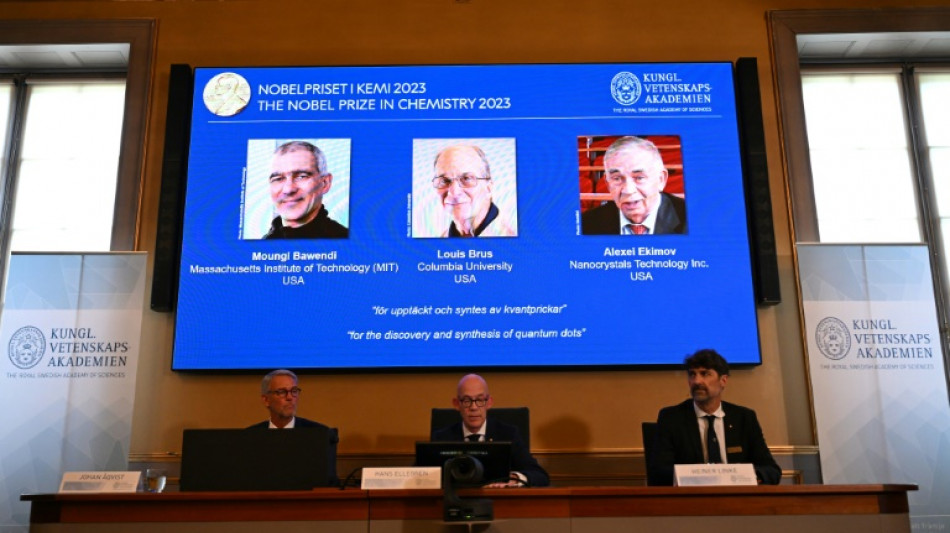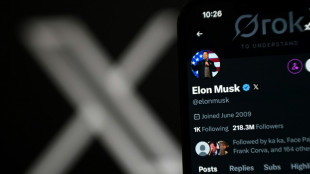
-
 Putin evokes WWII victory to rally Russia behind Ukraine offensive
Putin evokes WWII victory to rally Russia behind Ukraine offensive
-
China exports beat forecasts ahead of US tariff talks

-
 Leo XIV, the 'Latin Yankee', to celebrate first mass as pope
Leo XIV, the 'Latin Yankee', to celebrate first mass as pope
-
Most stocks lifted by hopes for US-China talks after UK deal

-
 IPL suspended indefinitely over India-Pakistan conflict: reports
IPL suspended indefinitely over India-Pakistan conflict: reports
-
German lender Commerzbank's profits jump as it fends off UniCredit

-
 Rare bone-eroding disease ruining lives in Kenya's poorest county
Rare bone-eroding disease ruining lives in Kenya's poorest county
-
India says repulsed fresh Pakistan attacks as de-escalation efforts grow

-
 Zhao's historic snooker title sparks talk of China world domination
Zhao's historic snooker title sparks talk of China world domination
-
'High expectations': EU looks to Merz for boost in tough times

-
 Poisoned guests rarely invited before deadly mushroom lunch, Australia trial hears
Poisoned guests rarely invited before deadly mushroom lunch, Australia trial hears
-
China sales to US slump even as exports beat forecasts

-
 Indian cricket to make 'final decision' on IPL over Pakistan conflict
Indian cricket to make 'final decision' on IPL over Pakistan conflict
-
Dethroned Bundesliga champions Leverkusen face uncertain future

-
 China can play hardball at looming trade talks with US: analysts
China can play hardball at looming trade talks with US: analysts
-
French monuments in trouble while PSG prepare for Champions League final

-
 Newcastle face Chelsea in top five showdown, Alexander-Arnold in spotlight
Newcastle face Chelsea in top five showdown, Alexander-Arnold in spotlight
-
Flick's Barca must show 'hunger' in crunch Liga Clasico

-
 Clasico the last chance saloon for Ancelotti's Real Madrid
Clasico the last chance saloon for Ancelotti's Real Madrid
-
Timberwolves overpower Warriors to level series

-
 Chinese fabric exporters anxious for US trade patch-up
Chinese fabric exporters anxious for US trade patch-up
-
Putin gears up to host world leaders at lavish army parade

-
 Nearing 100, Malaysian ex-PM Mahathir blasts 'old world' Trump
Nearing 100, Malaysian ex-PM Mahathir blasts 'old world' Trump
-
Leo XIV, first US pope, to celebrate first mass as pontiff

-
 Asian stocks lifted by hopes for US-China talks after UK deal
Asian stocks lifted by hopes for US-China talks after UK deal
-
Former head of crypto platform Celsius sentenced 12 years

-
 Ex-model testifies in NY court that Weinstein assaulted her at 16
Ex-model testifies in NY court that Weinstein assaulted her at 16
-
Genflow Biosciences PLC Announces Share Subscription, Director's Dealing and Update

-
 Argo Blockchain PLC Announces 2024 Annual Results and Restoration of Listing
Argo Blockchain PLC Announces 2024 Annual Results and Restoration of Listing
-
'Great honor': world leaders welcome first US pope

-
 Pacquiao to un-retire and fight Barrios for welterweight title: report
Pacquiao to un-retire and fight Barrios for welterweight title: report
-
Trump unveils UK trade deal, first since tariff blitz

-
 Man Utd one step away from Europa League glory despite horror season
Man Utd one step away from Europa League glory despite horror season
-
Jeeno shines on greens to grab LPGA lead at Liberty National

-
 Mitchell fires PGA career-low 61 to grab Truist lead
Mitchell fires PGA career-low 61 to grab Truist lead
-
AI tool uses selfies to predict biological age and cancer survival

-
 Extremely online new pope unafraid to talk politics
Extremely online new pope unafraid to talk politics
-
Postecoglou hits back as Spurs reach Europa League final

-
 Chelsea ease into Conference League final against Betis
Chelsea ease into Conference League final against Betis
-
Pope Leo XIV: Soft-spoken American spent decades amid poor in Peru

-
 First US pope shared articles critical of Trump, Vance
First US pope shared articles critical of Trump, Vance
-
'Inexcusable' - NBA champs Boston in trouble after letting big leads slip

-
 US automakers blast Trump's UK trade deal
US automakers blast Trump's UK trade deal
-
Stocks mostly rise as US-UK unveil trade deal

-
 Trump presses Russia for unconditional 30-day Ukraine ceasefire
Trump presses Russia for unconditional 30-day Ukraine ceasefire
-
Anything but Europa League glory 'means nothing' for Man Utd: Amorim

-
 'Inexcuseable' - NBA champs Boston in trouble after letting big leads slip
'Inexcuseable' - NBA champs Boston in trouble after letting big leads slip
-
Pope Leo 'fell in love with Peru'and ceviche: Peru bishop

-
 Pakistan's T20 cricket league moved to UAE over India conflict
Pakistan's T20 cricket league moved to UAE over India conflict
-
India tells X to block over 8,000 accounts


Three giants of chemistry connected by the quantum realm
This year's Nobel Chemistry winners are pioneers in the nanoworld.
During the 1980s, Alexi Ekimov, 78, and Louis Brus, 80, working independently and on opposite sides of the Iron Curtain, succeeding in creating "quantum dots" -- nanoparticles that are found today in next generation TV screens and are being used to illuminate tumors in the body.
A decade later, 62-year-old Moungi Bawendi revolutionized methods to manufacture them with precision and at scale, paving the way for their applications.
Here's the rundown on the 2023 Nobel Prize in Chemistry winners.
- Perseverance -
Bawendi was born in 1961 in Paris, France to a Tunisian father and French mother.
His family emigrated to the United States when he was 10 years old, and though he excelled at science in high school, he flunked his very first college chemistry class at Harvard.
"It could easily have destroyed me, my first experience with an F, the lowest grade in my class by far," he told reporters.
But he persevered, earning his undergraduate degree and later his PhD at the University of Chicago. He would later join Brus at Bell Laboratories, then finally the Massachusetts Institute of Technology (MIT), where he remains today as a professor.
"I'm especially honored to share this with Louis Brus, who was my postdoctoral mentor... I tried to emulate his scholarship and mentoring style as a professor myself," he said.
Bawendi built upon the work of his co-laureates and in 1993 succeeded in vastly improving the methods to create quantum dots, finding just the right solvent and temperature to grow nanocrystals to specific sizes.
- Colored glass experiments -
Ekimov and Brus grew up in the post-war era. Ekimov was born in 1945 in the former USSR, and graduated from Leningrad State University.
Ekimov was fascinated by colored glass and the fact that a single substance could yield many colors. By experimenting with temperatures and heating times of molten glass, he found he was able to vary the size of the particles produced and that the smaller the particles were, the bluer the light they emitted.
He published his findings in a Soviet science journal 1981, and was the first person to intentionally create quantum dots -- particles predicted by physics theory in the early 20th century but not until then demonstrated in reality.
At the same time, Brus worked at the legendary Bell Laboratories in the United States -- then a hotbed for scientific discovery -- on experiments that involved chopping up particles to provide a larger surface area and faster chemical reactions.
During his work, he noticed that the particles' optical and other properties shifted the smaller they became, something that could only be explained by quantum mechanics.
- Sputnik generation -
"I am a member of the Sputnik generation, raised after WWII as the United States dramatically expanded science and technology in response to the Cold War" he wrote in an autobiographical account after receiving the 2008 Kavli Prize.
Gifted from an early age in mathematics and science, he grew up in the suburbs of Kansas City, where he says he "developed an affinity for tools and machines by working after school and on weekends in the local hardware store."
He initially thought he would follow his father into business. But after receiving his doctorate in 1969 from Columbia University in New York, he served in the United States Navy, and became a researcher in a laboratory in Washington.
Then, in 1972, he began working for Bell Labs, where he remained for 23 years.
He is now a professor at Columbia University and a firm believer in the power of science.
"Scientists struggle daily with their experiments, and tend to lose sight of the enormous collective progress of science and technology over the decades," he wrote.
"Science has created a far better existence for mankind despite war, economic collapse and natural disaster."
P.Costa--AMWN


